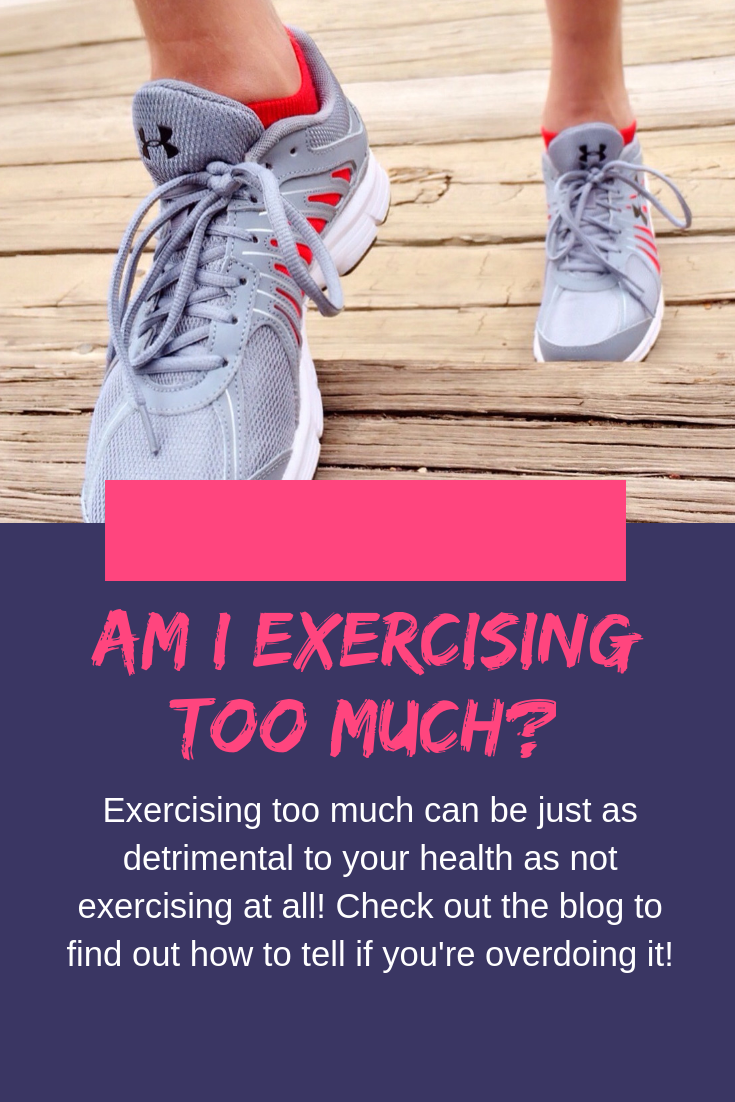Am I Exercising Too Much?
Ask the trainer: Am I exercising too much?
This excellent question was asked by one of the participants in my intuitive eating online course:
“I exercise quite a bit, but I’m never sure if I’m pushing my body too hard or not hard enough? Is it possible to exercise too much? How do I know if I am exercising too much?”
I am fortunate to have had the opportunity to meet and work with a lot of people. I would say eight out of ten women who walk into my fitness studio don’t exercise enough. Not too surprising, right? We work sedentary jobs with sedentary commutes, and by the time we get home we’re so mentally exhausted that the couch looks way better than the elliptical. The struggle is real! But every now and then I meet someone who actually exercises too much.
The benefits of exercise are dose-dependent. Too little isn’t good, but too much may be worse. Let me make a comparison to water. We all know that drinking enough water is critical for good health. Without it we die in three or four days. But what happens if you drink too much water? You can die almost instantly! An excessive intake of water can cause low blood sodium levels, which is potentially fatal.
Exercise is, first and foremost, a stress on the body. In the correct dose exercise is a good stress that forces our body to make positive adaptations: stronger bones and muscles, healthier heart, and decreased body fat. In the wrong dose - too long, too hard, too often - exercise can be detrimental. In this “ask the trainer” I talk about the pitfalls of over-training and how to know if you are exercising too much.
What happens in the body if I exercise too much?
Exercising too much, at too high an intensity, and/or too frequently, can cause hormonal changes and a depressed immune system. Testosterone and estrogen plummet, cortisol soars, and hunger hormones spike. Additionally, exercising too much can lead to muscle loss, diminished strength, and increased body fat. So if you’ve been hitting the gym really hard and haven’t seen any progress, are feeling exhausted and constantly hungry, or get sick or injured frequently, you may need to ask yourself “am I exercising too much?”
What other signs will tell me that I may be exercising too much?
Decreased performance. You can’t lift as heavy, jump as high, or run as fast. Everyone has off days, but if you consistently can’t seem to reach your normal intensities or mileage, it could be a signal that there’s a problem.
Apathy towards exercise. You normally love pushing your body and getting your sweat on, but lately you dread it or feel like skipping it altogether.
Fatigue and muscle weakness. Extreme muscular fatigue and mental fogginess are common signs that you’re doing too much.
Insomnia and sleep problems. Over-training causes hormonal upset, which frequently leads to “tired but wired” symptoms. You are exhausted, but you can’t sleep.
Fat gain. Yes, overdoing exercise can cause you to lose muscle and gain fat. If your diet is on point and you’re hitting the gym hard with no results, consider that you may need less exercise, not more.
Depressed immune system. You catch every cold and flu that your kiddo brings home from school, and it takes you longer to shake it. Too much exercise suppresses immune function.
Small nagging injuries. Shin splints, hairline fractures, tendonitis, and other chronic issues that affect bones, joints, and muscles are sure signs that you are overdoing it and not giving your body enough recovery time.
Delayed recovery from workouts. You feel worse after a workout instead of better, or are still sore and exhausted many days after.
Diminished sex drive. Exercising too much causes decreases in testosterone in men and estrogen in women. Disinterest in your partner and infertility can be the unfortunate results.
Gastrointestinal distress. Excessive stress can have a major impact on the balance of healthy bacteria in your gut. Bloating, gas, abdominal cramps, constipation, and/or diarrhea can be the yucky symptoms of a body under stress.
Ceased or irregular menses. If your period normally happens like clockwork and suddenly disappears or becomes intermittent, that’s a big red flag! Your doc may tell you it’s normal for athletes to experience this, but infertility due to exercise and/or semi-starvation is NOT normal for the human body. You are over-training!
Mood changes. Stress from any source – be it work, money, relationships, or exercise – can cause depression, irritability, and anxiety. If you notice yourself flying off the handle more easily or crying more often than usual, you may need to check your stress!
You skip social events to exercise, worry about missing a workout, or struggle to fit your life around your strict workout schedule; you exercise when sick, tired, or exhausted; you exercise to compensate for eating; you get irritated if something or someone comes between you and exercise. These may not be physical problems, but are often indicative of an unhealthy relationship with exercise, which can quickly lead to physical symptoms and over-training.
Okay. I think I’m exercising too much. Now what?
Give your body a break. This might be “Captain Obvious”, but for some people exercising less or letting go of a certain type of exercise that doesn’t work for their body can be very difficult. Take a week or two off and give your body a chance to fully repair itself. Keep in mind that it may take longer than a few weeks, and you may need to take an extended break if you’re very far down the over-training rabbit hole.
Eat enough. Over-training is often associated with under-eating as we attempt to achieve a specific “look”. When I was training for triathlons, I wanted to look like a triathlete (despite the fact that my body isn’t built thin and wiry like most top triathletes). I was training for up to four hours per day and eating 1500 calories, which isn’t even a maintenance level of calories for a moderately active woman of my age and size. This double whammy of exercising too much and eating too little leads to exceptionally poor recovery from long or intense workouts.
See a doctor. Over-training can cause some pretty serious issues such as nutrient deficiencies, bone loss, insomnia, heart problems, and hormone disruption. If your symptoms are severe or don’t go away after a period of rest, your doctor may need to run some tests…and can hopefully talk some sense into you about your training plan.
Cross train. I actually really like running, but when I attempt to run every day or nudge my mileage north of six miles during a run, my body rebels. I get plantar fasciitis, shin splints, and tendonitis in my knees. My body is telling me in no uncertain terms that it doesn’t like what I’m doing. Cross training is the answer. I still run, just not as frequently. I intersperse running workouts with biking, walking, weight training, swimming…and plenty of rest.
Rest. Exercise breaks down muscles and tissues. The real magic of getting stronger, faster, and better happens when you are resting. If you are training hard, a minimum of two rest days per week is mandatory for proper recovery. And remember that rest doesn’t necessarily mean sitting on your butt! If you find it hard to take rest days, try gentle and rejuvenating forms of movement like yoga, Tai chi, or hiking in the woods.
Seek support. There’s a fine line between exercising for health benefits and exercise compulsion. If exercise rules your life and you can’t seem to stop despite exhaustion and continued sickness or injury, you may need to seek counseling for “exercise addiction”.
Give it time. Our bodies are amazing but also complex and delicate. If one part of the system gets knocked down it can be like dominoes falling over, and recovery can take a long time. Once I finally came to terms with the fact that excessive exercise was hurting my body, it took over three years to fully recover. It took one year for my sleep, energy levels, hunger, and weight to normalize. It took two years for my body to have a single menstrual cycle, and another six months before my periods were regular again.
I learned my lesson the hard way about exercising too much. I hope you can learn from me so that you don’t have to go through it!




